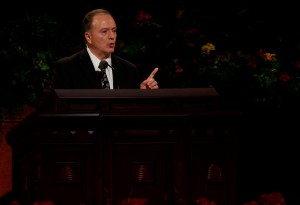
SALT LAKE CITY — Elder Lynn G. Robbins of the Presidency of the Seventy began his talk by relaying a question once asked him by President Boyd K. Packer: “Which way do you face?” When he asked for context, President Packer explained that a Seventy does not represent the people to the prophet, but the prophet to the people. Elder Robbins explained in his address that if there is a conflict between pleasing man or pleasing God, people must always choose to be loyal to God.
“Trying to please others before pleasing God is inverting the first and second great commandments,” he said. “It is forgetting which way we face.”
Elder Robbins spoke mainly about how the fear of scorn for condemning sin is a stumbling block in our spiritual progress.
Forgetting which way he faced had major consequences for the Prophet Joseph Smith, when at the young age of 22 he repeatedly asked the Lord for permission to allow Martin Harris to borrow pages of the Book of Mormon manuscript.
“Whatever Joseph’s reasons were, or as justified as they may appear, the Lord did not excuse them,” Elder Robbins said. “Thinking one can please God and at the same time condone the disobedience of men isn’t neutrality, but duplicity, or being two-faced, or trying to serve two masters.”
Elder Robbins encouraged listeners to be courageous rather than to compromise their loyalty to God and cited examples from the scriptures of people who spoke boldly for God, not fearing what men could do.
“The scornful often accuse prophets of not living in the 21st century or of being bigoted,” he said. However, he continued, lowering God’s standards to those of the world “leads to self-contentment, but not self-improvement and repentance,” he continued.
In a time with increased confusion and lowering standards in the world, Elder Robbins cautioned against matching the standards of the world. “Lowering the Lord’s standards to the level of a society’s inappropriate behavior is apostasy,” he said.
Elder Robbins closed by expressing his hope that members of the Church would be “(inspired) to go about doing good as anonymously as possible” and remember to love God above all else, “which is the first and great commandment.”




